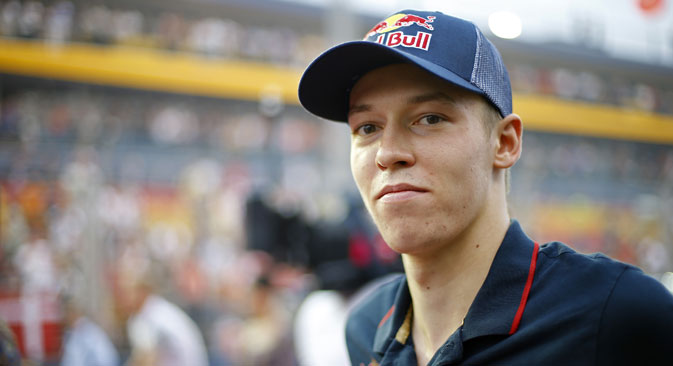
At 20 years of age, Kvyat’s boyish features and shy smile could easily allow him to pass for three or four years younger. Source: AFP / East News
Daniil Kvyat doesn’t look like a star of the racetrack.
When he walks into a room, his small stature and slim build make him look more like a jockey than a man who wrestles 600-horsepower beasts around tight turns.
At 20 years of age, Kvyat’s boyish features and shy smile could easily allow him to pass for three or four years younger. His hesitant way of speaking, combined with his precise English, Italian and Russian, calls to mind a talented young student of languages, rather than a global celebrity.
But despite all that, Kvyat is already a Formula One star, and next year he will become one of the biggest names in a sport with a global audience of around 500 million.
A week away from what will be the biggest race of the youngest Russian racer’s career, Sunday’s first-ever Russian Grand Prix in Sochi, Kvyat celebrated a triumph. Hours before the Japanese Grand Prix last weekend, he was confirmed to be replacing reigning world champion Sebastian Vettel on the Red Bull team.
That is a huge achievement for a young racer in his rookie season in F1. Kvyat arrived at March’s season-opening race in Melbourne, Australia as a relatively unknown figure despite being last year’s champion in the lower-level GP3 series. He announced his arrival with a ninth-place finish for two points in his debut race for Toro Rosso, Red Bull’s junior team, and has finished in the points in four other races so far, a very respectable record for a rookie.
However, when Vettel decided the time had come to jump ship from Red Bull to Ferrari, few would have fingered Kvyat as the replacement for the four-time world champion. After all, the 20-year-old Russian’s points tally was less than half that of his French teammate Jean-Éric Vergne, so was Kvyat as stunned as many fans were? Not at all.
"No, I'm not surprised," he told the assembled media. “I will do my absolute best to keep the team's name high, my name high, our name high. It will be interesting.”
Red Bull’s official statement on the switch called Kvyat a “rising star,” and opinion within Red Bull seemed to be that he may be slightly behind Vergne at the moment, but that he has greater long-term potential, a sentiment Kvyat echoed.
“I have been racing a long time even if I've not been in F1 for very long,” he said. “There are some things you can only learn by doing them and that's what I think will happen for me.” His target will be emulate Australian Daniel Ricciardo, who moved from Toro Rosso to Red Bull in the winter and has since won three races to take third place in the championship.
Kvyat will stay in his seat at Toro Rosso until next year, but the announcement ensures even more attention will be on him on Sunday, when he becomes the first Russian to race a Formula One car in his home country.
Handily enough, Kvyat has experience of winning at home. Back in 2012, when the Moscow Raceway circuit opened, he shrugged off pressure from the home crowd to win both his races in the Renault Eurocup series to a rapturous reception.
In his first year in F1, Kvyat has attracted attention not just for his smooth yet aggressive driving style, but also for his surname, which has presented a few TV commentators with a challenge. The standard response is to go for a version of Kuh-veeat, or even a three-syllable Kiviyat (the correct Russian pronunciation is a brisk, one-syllable Kvyat, even if it’s a bit of a mouthful for non-native speakers). As for his first name, in the world of F1, Daniil has universally become Dany.
Whatever happens, Kvyat’s race to Sochi this weekend will be more than a little different to his first visit to the Black Sea resort. That was back in 2005, when the then 11-year-old Kvyat won a junior karting race in pelting snow. With temperatures of 23 degrees Celsius forecast for race day this week, a snowy repeat is off the cards – no extra home advantage for the Russian there.
The Sochi Autodrom, which winds for 3.7 miles around shining venues from February’s Winter Olympics, will be a stern test for every driver on the grid, none of whom will be allowed to drive an F1 car on the site before Friday’s practice sessions. Kvyat will have an estimated 45,000 fans cheering him – could that give him an extra edge?
After Sunday’s Japanese Grand Prix at Suzuka ended in tragic circumstances with Marussia driver Jules Bianchi taken to hospital with head injuries after a crash, Sochi will be under immense scrutiny on safety. As F1’s most modern racetrack, it should theoretically be safer than any other circuit on the calendar, but with Bianchi still seriously ill in hospital, organizers will be aware that any failings will be mercilessly analyzed.
For F1 drivers, the injury to Bianchi made the results of the Japanese Grand Prix fade into the background – the thrill of victory disappearing sharply amid worry for a colleague, a fellow professional taking severe risks in the pursuit of success. Kvyat’s response was typical: “The only important thing this evening is that I hope Bianchi will be okay.”
It was a softly-spoken, measured contribution, but in that moment, Kvyat was every inch an F1 driver.
All rights reserved by Rossiyskaya Gazeta.
Subscribe
to our newsletter!
Get the week's best stories straight to your inbox